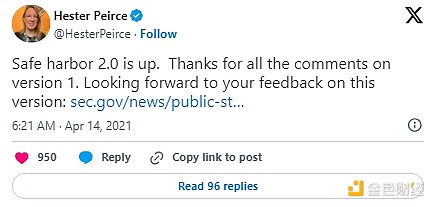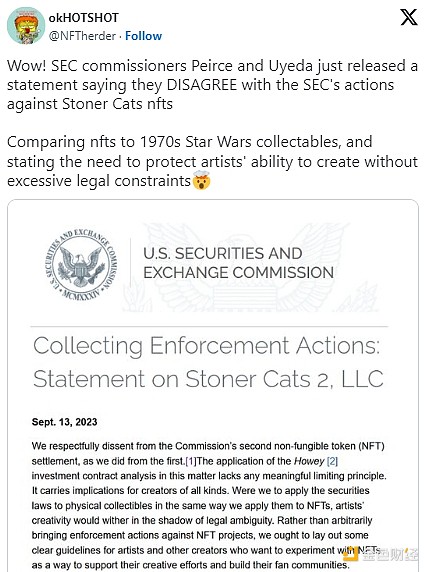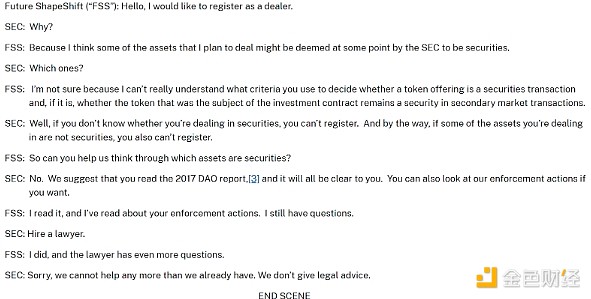Author: Jack Inabinet, Bankless; Translator: Deng Tong, Golden Finance
President-elect Donald Trump won the hearts of the crypto industry by promising to end the Biden administration's anti-crypto campaign and "fire" SEC Chairman Gary Gensler on day one.
Although Trump has yet to propose a replacement for Gensler and his ability to remove the current SEC commissioner appears legally questionable, crypto players are still ecstatic about the prospect that the new SEC chairman will soon ease one of the industry's biggest regulatory pain points.
Commissioners Hester Peirce and Mark Uyeda may have dropped out of contention for the chairmanship, but they have been outspoken advocates for digital asset freedom and regulatory restraint during their tenures at the SEC.
Today, we explore official statements from Peirce and Uyeda in hopes of understanding what a hypothetical pro-crypto Securities and Exchange Commission under a Trump administration might look like.
Proposed Token Safe Harbor
Commissioner Peirce began thinking about digital assets the day before Gary Gensler was confirmed as SEC Chairman in April 2021.
Recognizing that the new SEC Chairman would bring a new agenda of enforcement priorities, Peirce sought to steer the conversation toward how securities regulations should be tailored to accommodate blockchain-based tokens by publishing an updated token safe harbor proposal via GitHub.
Peirce’s updated proposal seeks to provide a three-year exemption, or safe harbor, from federal securities registration for developers of decentralized applications. It incorporates significant revisions to her previous draft in February, which was informed by feedback from the cryptocurrency community, securities attorneys, and the public.

Under the Trump administration, the pro-crypto SEC is expected to prioritize providing cryptocurrency transparency while actively soliciting industry feedback to develop regulations that balance the needs of emerging decentralized applications with the agency’s urgent need to protect the investing public.
Irreplaceable Follies
“Stoner Cats” is a collection of 10,320 NFTs minted in July 2021 for $8.2 million in ETH; proceeds from the sale will be used to fund the production of an animated series, also known as “Stoner Cats,” starring Hollywood stars such as Mila Kunis, Ashton Kutcher, and Chris Rock. In exchange for their purchase, holders of Stoner Cats NFTs will receive exclusive access to the series, unspecified future entertainment content, and an online community.
While the SEC ultimately settled with the entity behind Stoner Cats for conducting an unregistered securities offering, Commissioner Peirce and the lone Republican on the SEC’s commission, Mark Uyeda, opposed the enforcement action.
Commissioners Peirce and Uyeda acknowledge that NFT creators should not get a free pass from securities regulation, but they believe that the SEC’s application of securities regulation in this case would only lead to legal ambiguity.

Under the Trump administration, the pro-crypto SEC is expected to develop comprehensive guidance on how to apply security regulations to NFTs; to replace the uncertainty over the legal status of a hypothetical tokenized Pokémon card, there should be clarity on when digital assets can be exempt from securities regulation.
Token Tensions
In its most recent ostensibly controversial enforcement action against a cryptocurrency company, the U.S. Securities and Exchange Commission (SEC) settled charges against cryptocurrency exchange ShapeShift in March for acting as an unregistered securities dealer in the operation of its online crypto asset trading platform.
Although ShapeShift became a peer-to-peer decentralized exchange in 2021, for more than six years ShapeShift served as a broker-dealer, fulfilling inventory orders and acting as a counterparty to all cryptocurrency trades occurring on its platform.
While Commissioners Peirce and Uyeda did not dispute the assertion that ShapeShift operated as an unregistered securities dealer prior to 2021, in a separate joint dissent, they expressed concerns about the ambiguity created by the SEC’s enforcement action.
To qualify as an unregistered securities dealer, ShapeShift must have facilitated the sale of securities. The SEC’s unwillingness (or inability) to identify underlying securities or how sales of those securities create investment contracts has created an untenable environment for secondary trading in crypto assets.

Under the Trump administration, the pro-crypto SEC is expected to clarify which tokens qualify as securities, eliminating the threat of ambiguous misconduct faced by crypto-native exchanges such as Coinbase, while approving registered securities dealers to list such assets alongside existing products.
Looming Questions
Decades of precedent suggest that Chairman Gensler would resign and hand control of the SEC to a Trump appointee, but his term does not expire until 2026, and it is not at all clear that President Trump could forcibly remove Chairman Gensler before then without protracted litigation.
However, it is worth noting that many within the crypto industry interpreted Gensler’s recent remarks on November 14 as an informal resignation notice, such as the Chairman stating that he was “honored to serve.” As an independent regulator, the SEC enjoys significant autonomy from the executive branch, and despite Trump’s rhetorical promise on Day 1 to fire Chairman Gensler, murky case law may support the view that SEC commissioners can only be removed “for cause” rather than simply “at will.”
While the SEC chairman has discretion over the agency's budget and oversees its staff, they need a majority of the commission to appoint the head of an executive branch, and each commissioner has an equal say in agency procedural votes that guide how the SEC interprets and enforces securities legislation.
Commissioners are appointed by the president of the United States for five-year terms, but must be confirmed by a majority of the Senate. The end of terms is staggered to ensure that one member can be removed by June 5 of each year, and while commissioners can serve for an additional 18 months after their term expires to prevent vacancies, no more than three of the five commissioners may be of the same political party at any one time.

While Commissioner Crenshaw’s term expired on June 5 of this year, she continues to serve at the SEC and has been renominated by President Biden to fill the resulting vacancy.
If this vacancy lasts until before President Trump’s inauguration, he could easily fill the position with a Republican Senate candidate of his choice to solidify a seemingly pro-crypto majority within the SEC. Unfortunately, there is still plenty of time for the currently Democratic-controlled Senate to confirm Crenshaw for an additional 5-year term, and the Biden administration could always make a sneaky recess appointment after the Senate adjourns on December 20.
Even in the scenario where Gensler does not resign and assuming Crenshaw’s reelection is confirmed, President Trump can still exert his power over the SEC by appointing the reluctant Peirce and Uyeda.
While no clarifying rulemaking activity will occur in this scenario, the Acting Chairman gains control over the SEC staff, giving them the power to revoke controversial SEC Staff Accounting Bulletin 121, entertain requests for no-action letters, suspend or terminate ongoing enforcement investigations and proceedings, and solicit public feedback as a first step in future cryptocurrency rulemaking proceedings.
 Edmund
Edmund












